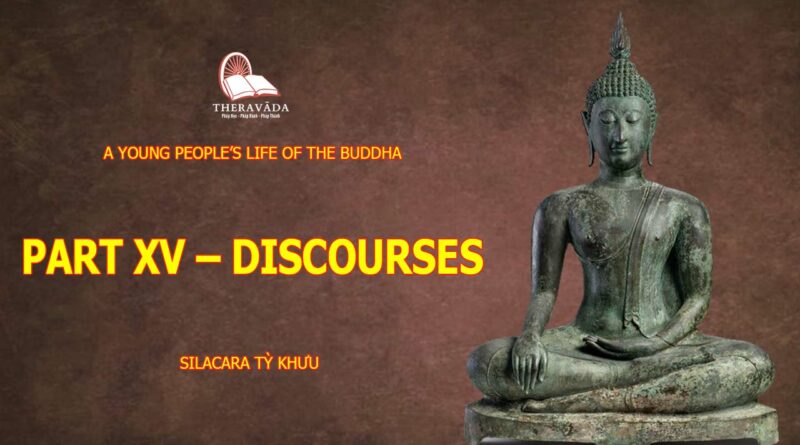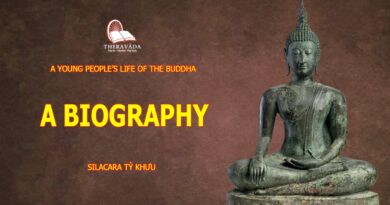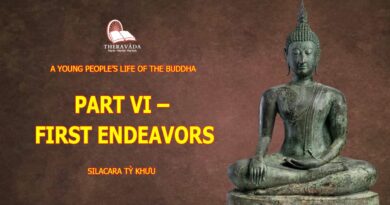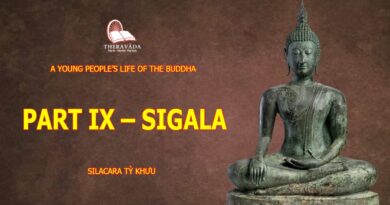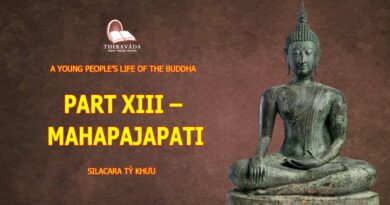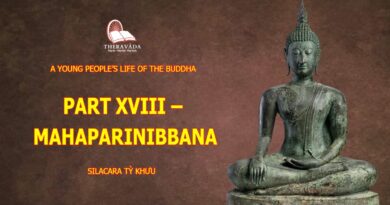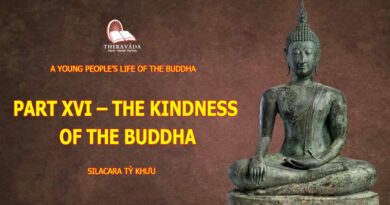A YOUNG PEOPLE’S LIFE OF THE BUDDHA: PART XV – DISCOURSES
As the son of a king, and so, accustomed to the manners of a royal court, the Buddha was perfectly at home, entirely at his ease, in the company of the greatest kings and warriors and priests, and could hold His own in conversation with any of them, even the most learned, and send them away pleased and delighted with what they had heard from Him. But He was equally as well able to speak in a manner common people could understand, and as He wandered about the country on foot, was always ready to talk to any one He happened to meet — farmers, blacksmiths, wheelwrights, barbers, anybody who liked to speak to Him.
Thus, one day as he was traveling through a district covered with paddy fields, He fell in with a farmer at work in his field, and stopped and began talking to him about his cattle, and plowing, and seed, and about how he expected his crop to turn out this year. “You know,” He said to the farmer, “I am a farmer, too, and I have got all the things needed for working my fields, and the seed as well.”
“You a farmer!” said the surprised cultivator. “Where then have you left your bullocks, your plow, and the other things you need?”
“I have got them all with me here,” said the Buddha calmly. “Listen to me, and I’ll tell you all about it.”
“My seed is the warm desire and feeling of compassion which caused me to resolve to become a Buddha, as also the knowledge which I obtained under the Bodhi Tree. The rain that watered my seed and made it grow richly and abundantly, was the constant good deeds I did until I became a Buddha. My knowledge is the yoke, and wisdom the shaft of my plow. My heart is the reins with which I guide my bullocks. My plowshares is the diligence with which I get rid of all evil things in me. The handle of my plow is the Doctrine which enables me to remove all that is bad and promote all that is good. When you go plowing, you cut up and overthrow all bad weeds; so he who has learned the Four Noble Truths cuts up and overthrows all evil inclinations within him. At night, when your day’s work is done, you unyoke your bullocks and let them go wherever they like. In the same way the wise men, in cleaving to what is perfect, lets go whatever is not perfect. Your bullocks have to strain and toil in order to do their work of plowing your fields; and in the same way the wise man has to strive with all his strength, and turn over the soil of his own nature, so as to reach Nibbana. The cultivator works hard in order to prepare his field for the seed; and in the same way the wise man has to work hard to get rid of the ills of existence. But the man who works in the paddy fields is often disappointed in the size of the crops he gets as the outcome of his toil and sometimes he has to go hungry. But whoever works in the fields of wisdom, never is disappointed; he is sure to reap the full results of his labors; he is entirely happy, perfectly satisfied when he comes in sight of Nibbana. In this way it is, O farmer, that I am a farmer also. And this, too, is the way in which I do my work.”
And the cultivator to whom the Buddha spoke this little sermon was so well pleased with it that he asked the Buddha there and then to accept him as a cultivator in the field of His Good Doctrine, and he became a follower of the Buddha for the rest of his life.
To another person who came to the Buddha and asked to be told the way in which common people might reach the best and happiest state, the state of Nibbana, the Buddha gave these simple instructions.
“Avoid the company of the foolish; cultivate the companionship of the wise. Show respect to those who are worthy of respect. Remain in a position that is in accordance with your abilities. Always perform meritorious deeds. Constantly aim at perfect behavior. Take pleasure in hearing and seeing all you can so as to acquire knowledge. Study everything that is not evil. Acquire a knowledge of what ought to be shunned. Speak only what is true, kindly and profitable. Be kind to, and support father and mother. Care for, and cherish wife and children. Resist temptation to do evil. Give alms. Observe the rules of right conduct. Assist relatives and friends when they are in need of assistance. Do nothing that is not permitted by the law of good. Abstain from intoxicating drinks or drugs. Do not be slow in doing good deeds when an opportunity to do them arises. Be courteous to all men. Be humble. Be easily satisfied. Acknowledge kindness received with gratitude. Listen to the preaching of the Doctrine in proper season. Be patient and forbearing. Take pleasure in profitable conversation. From time to time visit those who lead the holy life. Converse with them on religious subjects. Practice virtuous behavior. Bear in mind the Four Noble Truths. Keep ever before the mind’s eye the goal of Nibbana. In the midst of every affliction, be unshaken, unperturbed, fearless, and composed. Who observes these perfect rules shall never be overcome by evil; he will always enjoy perfect peace of mind.”
On another day when the Buddha was resting in a little village, the people of the place came to him and said:
“Reverend Sir, we know that you are a great religious teacher, and have taught much that is good to those disciples of your who follow you about and live the homeless life just as you do yourself. But we are not ascetics. We are just common folk who love our wives and children, and earn our living cultivating our fields and breeding cattle, and we take whatever innocent enjoyment comes our way. We use gold and silver. We like to ornament ourselves on holidays and feast days with jewelry and flowers. We use oils and perfumes to make our bodies pleasant to us. We follow the ordinary ways of the world. Now, Reverend Sir, if there is anything in your teaching that would be good for us to know, anything that would help us to be happy here and now as well as in the future, be pleased, Reverend Sir, to let us hear that part of your teaching, so that we may follow it and get the benefit of it.”
“Well, villagers,” said the Buddha, “there are four things which a teacher like myself has to teach which are good for you and everybody who is not an ascetic to know and observe. Listen, and I will tell you about them.
“First: Whatever may be the employment by which you earn your living, in that business you ought always to do your best to make yourselves efficient. If you are a farmer you should try to be a good farmer, and make your fields grow all they can. If you are a merchant you should try to be a wide-awake and enterprising merchant. If you are a servant you should try to be a reliable and trustworthy servant. Be active and energetic always so as to get the best and fullest results from what you do, whatever it may be. In this way you will acquire wealth and be able to do good with it — to help any one who may need help. For it you do not acquire wealth by working for it, you will not be able to do good deeds and help others, for you will have nothing with which to help them.
“Second: You ought to take proper care of your wealth after you have got it, and not waste it in foolish ways. It is of no use to put water in a jar out of which it is allowed to run away again through a hold in the jar. It is good to get wealth, but it is every bit as necessary to see to it that when it is got it is not lost again in all sorts of foolish and wasteful ways.
“Third: People in worldly life should choose only good people for their friends and associates. People mostly become like the kind of people they mix with. If a man goes with good men, he has a good chance of becoming a good man himself. And if he goes with bad men, he is very likely to become bad too. You cannot touch black things without getting your fingers made black. So household folk should frequent the company of others who are good and wise and liberal and full of faith in what is good, and then they also will be likely to become good and wise and liberal and full of faith in what is good.
“Fourth: The householder should follow a regular and moderate way of living. He should not be extreme or extravagant in his way of life. He should not spend or give more than what he gets as income. If he does his wealth will be like a pond that has more streams running out of it than it has running into it. Such a pond very soon will run dry, and have no water in it at all. And very soon a man who pays out more then comes in to him, will have no more wealth. But if a man takes care to spend on himself and his family, or give away in charity, always a little less than his income, then the pond of his wealth will never run dry. There will always be some water, that is some wealth in it, for use when any sudden need for it arises. But this does not mean that he is not to make full use of his wealth. It does not mean that he is to heap it up and hide it away and not use it. A man who does that is like one who has a tree full of fruit in his garden, but instead of eating the fruit when it becomes ripe, puts it all away in a box to keep it there. Such a man will find that all his fruit will go rotten and he will get no good of it at all.
“These, then, O householders,” said the Buddha in concluding this sermon, “are the four things that will promote your success and well-being in this world if you observe them. And now I will tell you what are the four things which will promote your best good in the future. They are, first: Faith in the teaching that the doing of good will bring good results, and the doing of evil, evil results. Second: The constant practice of good deeds, and the avoiding of evil deeds such as killing, stealing, lying, lewdness, and drinking intoxicating drinks. Third: The practice of liberality in giving so as to learn not to cling too closely to the things of the world. Fourth: The acquiring of wisdom so as to know and follow the path that leads to Nibbana.”
Such was the sermon which the Lord Buddha delivered to these country villagers who wanted to know what ordinary household folk, not Bhikkhus or ascetics, could do to make sure of their well-being both here and hereafter. And they were all very much pleased with the plain practical advice which the Buddha gave them.
One of the longest discourses ever delivered was spoken, not to common folk nor yet to His Bhikkhus, but to no less a person than a king, King Ajatasattu of Magadha.
This King Ajatasattu was not a good man; he was, indeed, a murderer. He caused his own father, King Bimbisara who had been one of the first friends of the Buddha when he became Buddha, to be starved to death, and in this cruel and unrighteous manner, came to the throne himself.
It happened that one night of the full moon, King Ajatasattu sitting on the terrace of his palace, did not know what to do for entertainment, and decided that he would go and visit the Buddha who was then staying in a garden not too far away that had been given to Him and His Bhikkhus by the good physician Jivaka. When the king got to where the Buddha was, he found Him sitting quietly with all his Bhikkhus round Him in the preaching hall. The king exchanged the usual greetings of courtesy with the Buddha, and after taking a seat, asked the Great Teacher if he could tell what was the benefit or advantage of living like an ascetic. “What profit is it to a man to live like a Bhikkhu?” said King Ajatasattu. [*] “I have asked several other leaders of ascetics this question, but I have never received a satisfying answer from any one of them. They always answered by telling me about something else I did not ask about. It was as if a person should enquire about bread-fruit, and in reply be told all about mangoes. So I shall be highly pleased, Reverend Sir, to hear what you will say in reply to this question of mine.”
* [Read “The Fruits of the Homeless Life,” by the author, or the Visible Fruits of a Buddhist Monk,” by J. Wettha Singha.]
Then the Buddha, after a few words exchanged back and forth, proceeded to tell King Ajatasattu at great length all the benefits that come to a man both in this life and afterwards through becoming a Bhikkhu; and He did it so well that when He had ended His long discourse, Ajatasattu declared himself entirely satisfied that what the Buddha had answered was true, and that it was the best thing in the world to be a Bhikkhu if a man could be one, honestly and sincerely and follow so great and good a teacher as the Buddha. And he asked the Buddha to look upon him henceforth as a follower of His and not of any other religious teacher.
After the King had gone away again, the Buddha said to the Bhikkhus round Him:
“O Bhikkhus, this king was much moved in his mind just now as I was speaking to him. If, O Bhikkhus, this king had not done that evil deed, had not caused the death of his father the just king, there where he sat just now, he would have seen the Truth with clear eyes, and left his throne and everything behind him, and become a Bhikkhu and an Arahan.”
This, the longest sermon the Buddha ever spoke can be read in its complete form in the Digha Nikaya of the Sutta Pitaka. It is called the Samannaphala Sutta, or the Discourse concerning the fruit of the life of an ascetic.
And here is the shortest sermon the Lord Buddha ever delivered;
Some one once asked the Buddha: “What is the best thing anybody can give as alms? What thing has the best taste? What thing gives the most pleasure? What thing is best fitted to bring passion to and end?” And the Buddha replied to all these four questions with just this one word: “Dhamma.”
Of course His questioner then asked Him to explain a little more what He meant; and the Buddha then said:
“The giving of alms, though it is a good thing to do, cannot by itself bring a man on to the Path that leads to Deliverance: only the Dhamma can do this. Therefore the making known of the Dhamma, the trouble a man takes to give a knowledge of the Dhamma to others — this is the best kind of giving, this is the best kind of alms.
“Also, through learning the Dhamma, the heart is filled with joy and the mind delighted with its sweet taste, because it destroys all those passions in men which cause them suffering, and brings them at last to the final end of all sufferings — to supreme Nibbana. Therefore the Dhamma is the most sweet tasting of all things, and the most pleasing of all things, and the best thing in the world for putting passion to an end. And so, my disciples, preach the Dhamma to all mankind, and thus you will be giving the very best of alms to all beings that live on the earth or in the heavens.”
Source: Budsas.net

